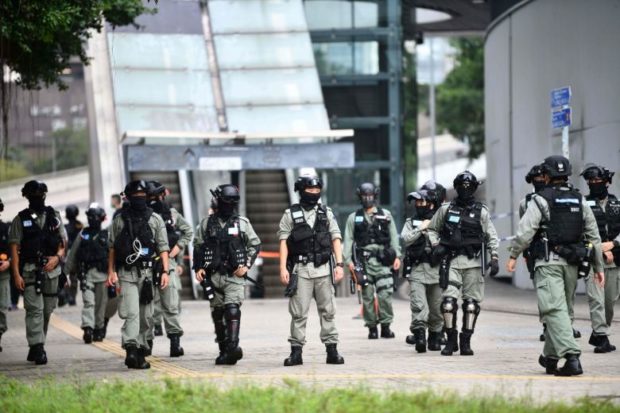Tight security in Hong Kong ahead of planned protests over national anthem bill, new security law

Riot police stand guard outside the Legislative Council in Hong Kong, on May 27, 2020. AFP via The Straits Times/Asia News Network
HONG KONG — Protesters in Hong Kong tried to block roads and disrupt traffic early Wednesday (May 27) morning but heavy police presence and searches ahead of the second reading of the national anthem Bill have put a dent in their plans.
Some drivers tried to disrupt the traffic at the cross-harbor tunnel at about 8:30 am by driving slowly but officers intercepted those vehicles concerned and diverted traffic.
Police officers were clearing roadblocks in several areas after a group of “thugs” sought to disrupt traffic with nails and other debris, police said in a statement posted on Facebook.
It warned commuters to check traffic conditions before heading out. “The police warn the mob to stop illegal activities immediately, otherwise they will be arrested,” it said.
Police said seven people aged between 14 and 22 have been arrested for possessing offensive weapons including petrol bombs, screwdriver and protest gear.
Article continues after this advertisementThe planned protest and strike on Wednesday is the latest indication of the strength of the anti-government movement that led to unrest in the city last year and is now gathering against a proposed national security law, and a controversial national anthem Bill due to be read a second time.
Article continues after this advertisementNetizens called for protests on Wednesday morning and at night, while more than 30 trade unions spanning across aviation, hotel and beauty industries on Tuesday called for a strike against the move.
They said high-ranking officials, who one by one have pledged support for the proposed law, drafted by Beijing last week, were backing it to protect their own interests.
Under the new law, it would become the norm for people to report each other, they said.
While schools are due to re-open, the Secondary School Students’ Action Platform, a group linked to political party Demosisto, said pupils would skip class to protest the national anthem Bill, which would bar any disrespect of China’s national anthem.
Classes for Secondary 3 to Secondary 5 students will resume Wednesday. Younger pupils in grades Primary 4 to Secondary 2 will go back to school on June 8, and Kindergarten 3 to Primary 3 on June 15.
Hong Kong schools have been shut since the Chinese New Year holidays in January.
In anticipation of chaos and disruption, local media said some 3,000 officers will be deployed to manage the situation.
Authorities erected a wall made of two-meter-tall, white and blue plastic barriers filled with water around the Legislative Council (Legco) building, extending across a nearby park up to Victoria Harbor.
Around midnight, riot police roamed the park, with squads stationed outside Legco and the neighboring Central Government Offices building. Several police vans were parked on nearby roads, Reuters reported.
Local media HK01 reported that about 20 of the pro-government lawmakers stayed overnight in the Legco to prevent the recurrence of June 12, the second reading of the now scrapped extradition Bill, where protesters surrounded the building and no one could get in or out.
On Tuesday, the police issued a statement to warn the public of planned disruptions including the blockage of main carriageways in various districts at rush hour in the morning to paralyze traffic, and action to surround the Legco where the national anthem Bill will be read again.
“Police will not tolerate any illegal actions that breach social peace. Resolute enforcement actions will be taken. Offenders will be arrested and any vehicles that cause serious obstruction will be swiftly towed away,” warned the police.
Beijing’s resolution on the national security law, to be passed on Thursday, does not amend the Basic Law – Hong Kong’s mini Constitution – but critics say it goes further, allowing Chinese security agencies to be set up in the territory to help with enforcement.
Beijing expanded the scope of the draft legislation to include organizations as well as individuals, local media reported on Wednesday. It would cover not just behavior or acts that endanger national security, but also activities, local broadcaster RTHK and the South China Morning Post reported.
In Washington, President Donald Trump on Tuesday said the United States would announce before the end of the week a strong response to the planned security legislation for Hong Kong.
When asked at a news briefing if the response would include sanctions, he said: “No, it’s something you’re going to be hearing about … before the end of the week, very powerfully I think.”
Under Article 23 of the Basic Law, the Hong Kong government is authorized to legislate national security laws; “however, it does not preclude the Central Authorities from legislating at a national level for national security”, the Department of Justice said on Monday.
The proposal has created an uproar in the city, with thousands of protesters gathering at Causeway Bay on Sunday to show their disapproval, despite a ban on public gatherings of more than eight.
Riot police fired volleys of tear gas and rounds of pepper bullets to disperse the crowd, making at least 180 arrests. Some people were admitted to hospital.
Besides blocking roads with debris, barricades and traffic cones, some protesters also smashed the windows of what they believed to be pro-government shops in Wan Chai.